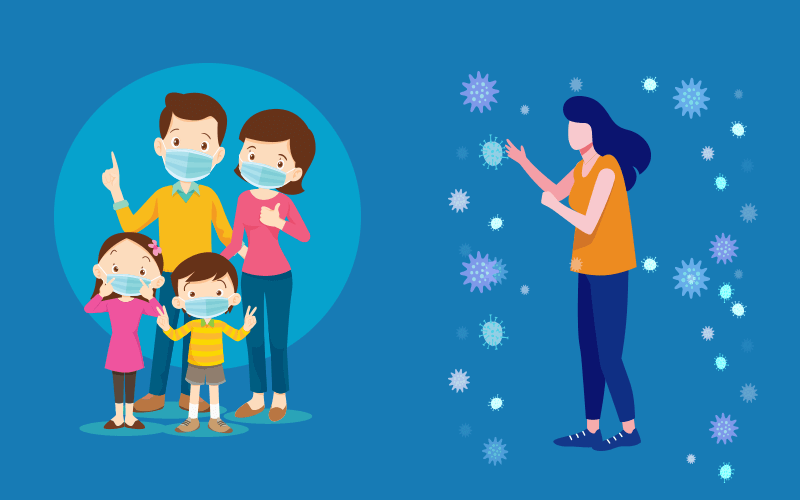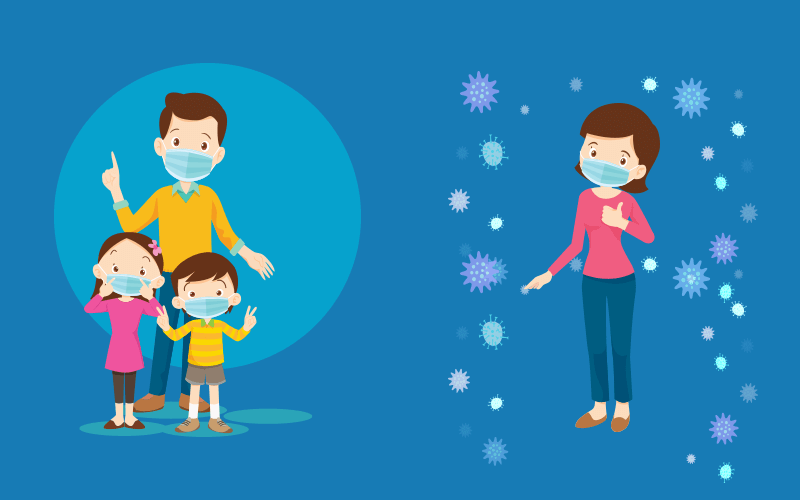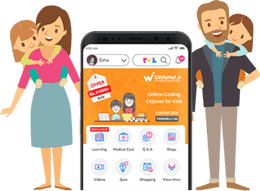Blogs
Covid-19 - Protocols For Isolation With Children And Other Family Members

The situation under Covid-19, especially with the second wave, has caused an austere disruption between families and relatives. However, heroic stories from across the country about how people have acted like superheroes and worked relentlessly to help people deal with the Covid-19 crisis motivated all of us to remain hopeful.
Here we shall discuss a very stressful situation and a cause of concern - how to isolate at home, with kids or in a joint family set-up? Having a separate room or area to isolate a single member is not possible in most cases. But, to save the other members from getting infected is the moral responsibility of every person.
With limited space options, or having kids in the family following home isolation or home quarantine protocols and guidelines issued by the governing authorities is not easy.
What Is The Difference Between Quarantine And Isolation
Quarantine
If a person needs to quarantine or stay home for 1-2 weeks if suspected to be infected or exposed to any condition that makes it likely to contract the Covid-19 virus. The person may or may not have symptoms but needs to take this measure to negate the chances of passing on the infection to others.
Isolation
If a person is covid positive, with or without symptom, isolation from healthy people is required upto 10 days or until the Covid report is negative to break the chain of transmission.
How To Isolate Or Quarantine At Home
1. With kids and people with existing comorbidities

The member who is covid positive should isolate in a separate room with an attached bathroom. The rest of the members of the household should wear masks all the time.
Only one person should take up the responsibility of attending and taking care of the isolated/sick person. The caregiver should wash hands regularly each time after contact with any surface or things from the quarantined person's room. Especially if you have children who are likely to touch objects around them without precaution.
The optimum measure is to let the isolating person wash their utensils and clothes themselves. But in case they are not well enough to do so, the caregiver and the patient should ensure wearing double masks while exchanging things. Wear hand gloves while washing the utensils and clothes with hot water and disinfectant detergents and give the same back for reuse.
Kids tend to be playful and might not understand the seriousness of the situation. They should be strictly kept away from the isolation room, any surface, or items that may have been touched by the sick person.
Keep the children and elderly or people with existing health conditions in a separate room when/if the sick person has to use any common areas such as bathrooms. The whole place/bathroom/ passageway and surfaces should be sanitized after every use before letting the children and the elderly out of the room.
If more than one person is Covid positive, isolate in the same room with all protocols like masking, sanitizing, washing hands. It is easier to pass the period than being alone.
2. If The Primary Caregiver/ Parent Has Covid-19

The dire situation seems multifold when the parents/primary caregiver is covid positive without any other adults in the household to take care of children.
An older child is the one who is mature enough to take care of oneself and legally allowed to be alone at home. The parent/s should adopt all isolation protocols to prevent the spreading of infection to other members.
Asking help from people outside the home by providing cooked food or running errands is necessary to help the child cope with the responsibilities.
Children who cannot take care of themselves have no option other than to stay with their parents (sick with Covid-19). If at all possible, ask other family members or arrange other caregivers till the parents recover. Otherwise, supervising the child/ren during the recovery period with the highest possible Covid-19 protocols is necessary to keep them safe.
Both the child and parents should wear masks all the time. If the child is too young to wear masks, parents should wear double masks.
Keep a distance of 6 feet from the child or isolate in a separate room, if possible. Wash your hands frequently, especially before touching any common-use surfaces.
Ensure that the house is well-ventilated, do not use air conditioners and keep the windows open with the fan on.
If the sole caregiver is sick, always sanitize/disinfect any item you exchange with your children, except food. If there are other family members, ask them to take complete responsibility for the child and self-isolate yourself in a separate room.
CALL EMERGENCY number or your consulting doctor if your condition worsens, or are unable to take care of the child, or your child shows any symptoms of Covid-19. You should always stay in touch with your extended family outside the household and inform them if you are not in the condition to take care of your children.
3. If the child is Covid Positive

Getting a covid positive report of your child is heartbreaking, an agony that only a parent can comprehend. Keeping the anxiety and panic at bay, you need to be your strongest self to pass through this situation. On a positive note, based on the studies, Covid-19 does not affect children severely. They mostly recover in home isolation and with mild or no symptoms at all. But as they can be carriers of the virus, keeping them isolated till they recover is essential for stopping the chain of transmission.
The child should get immediate medical attention if the symptoms are moderate to severe.
There should be absolutely no contact with others, playdates, or visitors in the house.
The child should be separated from the rest of the household, and ideally, only one person should be responsible for taking care of the sick child, who should also follow all quarantine measures as if they are also at the highest risk of contacting the infection.
As younger children are not easy to isolate and cannot be made to wear masks all day or no mask at all if they are younger than 2 years. So for everyone else's safety, all members should wear masks all the time.
Older children who are capable of managing themselves alone should be isolated separately with home isolation protocols.
Isolate the child in a room that has a bathroom facility if possible. Otherwise, sanitize and disinfect the space every time the child uses one.
The primary caregiver should care for them like normal, with double masks but make them feel loved. Do activities and games with them to keep them entertained. Answering their doubts and questions related to the situation helps them gain confidence to overcome and recover better.
4. If there is no separate space to isolate
Indian Households do not necessarily have separate rooms for each family member. This can become a confusing situation when the need to isolate or quarantine arises. Here are some pointers to adopt while isolating in a house in case of space constraints.
Try to keep the best possible space to separate the sick person/s from the rest of the members, especially the children, the elderly, and people with existing health conditions.
Create partitions with cardboard poster boards, bedspreads, shower curtain if the sick person and the rest of the household has to stay in joined space.
Continous sanitization of shared spaces and ventilation by keeping windows open in the safest way possible is a must.
Create separate beds for the sick person, and if even that is not possible, sleep facing opposite ends of the bed, with masks (N95) on.
If the bathrooms are shared, the isolating person should clean the space with disinfectant after every use. If it is not possible, the caretaker should clean the washrooms after every use by the sick person wearing a mask (N95), disposable gloves. Keep the bathrooms ventilated.
The laundry, linens, clothes, utensils should be washed in the hottest possible water with disposable gloves and mask all the time and should not be touched by any other member other than the caretaker.
There should be absolutely no visitors (except medical help) as all the people staying together at high risk of contracting the virus. Hence, all the members should stay as per the quarantine protocols.
Covid-19 is dangerous, and taking precautions for reducing the risk of transmission is absolutely mandatory.
Timely testing and treatment can save from getting severely ill from Covid-19. Isolating strictly helps in preventing other family members from getting sick and break the chain of transmission.
In case you or any family member has contracted coronavirus, do not self medicate. Always consult a doctor. Keep the patient connected with the family and friends through video calls, as empathy and compassion play an imminent role in their faster recovery and boosting their morale.
Reach out to us if you have any questions or doubts about home isolation or quarantine. We are in this together!
For much more than just parenting download our app
Love this blog? Share it with other parents.





